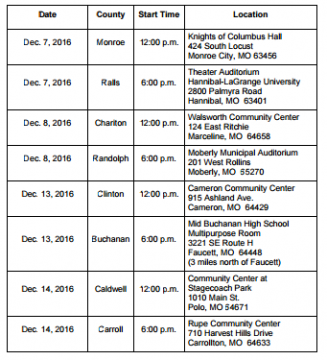JEFFERSON CITY, Mo. – As the Missouri Public Service Commission prepares for a series of public hearings in counties affected by the proposed Grain Belt Express Line, the commission met on Wednesday to finalize details. Only four members of the commission were attendance; Commissioner Bill Kenney was absent.
Eight hearings have been scheduled in Buchanan, Clinton, Caldwell, Carroll, Chariton, Randolph, Monroe and Ralls counties. Each county will be affected by the transmission lines in the wind energy project.
The first hearing will take place next week on Dec. 7, with hearings lasting through Dec. 14.

The format of each hearing has been predetermined by the commission with witnesses being allowed to testify at only one of the hearings. The commission has said there will be no Q&A sessions.
The final issue of discussion was about the time allotted for each witness. The commission had previously agreed that they would allow five minutes per person.
In Wednesday’s agenda meeting, Judge Michael Bushmann asked the commissioners to clarify the final decision on the time allotments and decide whether witnesses could be allowed to exceed the maximum five minutes.
The commission all agreed that the best thing to do is defer to the judge at the hearing.
The PSC also approved an order to overturn a decision by the North American Numbering Plan Administration and give CenturyLink more numbering resources to provide services to SSM in Lake St. Louis.
The commission also discussed an application request from Ameren Missouri. The utility company asked for approval and the authorization to begin a pilot program for solar energy.
As part of the Solar Partnership Pilot, Ameren would construct several solar generation facilities, which the company would own and manage in its service territory. The purpose of this pilot program would be to look at how small-scale solar generation can impact Ameren’s distribution system as well as gauging customer interest to participate.
The commission went through each issue listed in the judge’s memo, addressing each one by one. After breaking down the case, the commissioners agreed to move forward with the pilot program.
“There is a need for this service, the applicant is clearly qualified and has the financial ability to provide the service, it is economically feasible and is in the public interest,” Chairman Daniel Hall said. “It’s a very interesting concept, and will be interesting to see how it develops.”
The PSC quickly worked their way through five orders on the agenda, approving compliance tariffs for Kansas City Power and Light’s Greater Missouri Operations, as well as an order for Missouri-American Water Company to acquire sewer assets and grant a certificate of convenience and necessity (CCN). Both items were approved with a 4-0 vote.
Another issue brought before the commission was one that had been ruled on just two weeks ago. The commission had granted a motion for default determination against Missouri Utilities Company, as the company had failed to file reports in 2013, 2014 and 2015. They also approved a procedural schedule in the case of Midwest Energy Consumers Group vs. Westar Energy and Great Plains Energy, Inc. That issue centers around a complaint that says Westar violated the law by not seeking prior authorization from the commission before disposing or consolidating its system in regards to the acquisition by Great Plains Energy. An oral argument is scheduled for Dec. 21 at 10 a.m.
In Wednesday’s agenda meeting, PSC was asked to set aside the motion, allowing the company purchasing the assets of Missouri Utilities to move on with the process. That motion was approved 4-0.
The final order of business before adjournment was noting a change in the normally scheduled agenda meetings. Next week’s meeting has been moved to Tuesday, Dec. 6, to adjust to the demands of the Grain Belt hearings.
Benjamin Peters was a reporter for The Missouri Times and Missouri Times Magazine and also produced the #MoLeg Podcast. He joined The Missouri Times in 2016 after working as a sports editor and TV news producer in mid-Missouri. Benjamin is a graduate of Missouri State University in Springfield.







